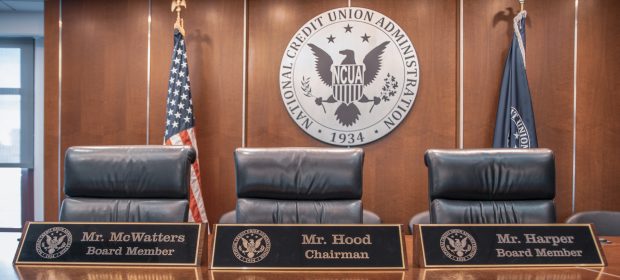 The NCUA Board (Source: NCUA)
The NCUA Board (Source: NCUA)
New NCUA Chairman Rodney Hood wants an additional delay in the NCUA's Risk-Based Capital rules, according to answers to written questions posed to him as part of the confirmation process.
"I would support a further delay to the implementation of the RBC Rule, so that I and my fellow Board Members can further study and assess its real effects on the credit union system," Hood wrote, in answering the questions.
Recommended For You
Members of the Senate Banking Committee submitted questions to Hood and fellow nominee Todd Harper following their confirmation hearing. The Senate Banking Committee does not make them public, leaving it up to each of the senators to decide.
However, the questions and answers are included in the version of the hearing transcript prepared by the Government Publishing Office.
And they provide a guide to issues that may divide the three-member board, which has a full membership since April 2016.
Hood, a Republican, said that with two new members of the NCUA board, an additional examination of the RBC is warranted.
But Harper, a Democrat, said that he wants to know about the actual capital held at the 20 or so credit unions that would be affected by the rule before deciding whether it should be delayed.
He also said he believes that if the RBC rule had been in effect, some of the losses associated with credit unions with a heavy concentration of taxi medallion loans might have been mitigated.
Last year, before the two new members took office, the NCUA board agreed to delay the RBC rule one year, until Jan. 1, 2020.
However, when the rule was first adopted in 2015, board member J. Mark McWatters questioned whether the agency had the authority to issue an RBC rule.
With McWatters still on the board and Hood calling for an additional delay, there may be the votes needed to push the effective date back even more.
Hood and Harper addressed a variety of other issues in answers to questions posed by Banking Committee members.
Underserved Areas
Hood and Harper said that Congress should allow all credit unions, regardless of their charter type, to add underserved areas to their fields of membership.
"Doing so would allow these institutions to offer financial services to those with no or limited access to credit union membership," Hood said.
"This change to the law would likely have the greatest impact on expanding access to affordable financial services for the unbanked and underbanked," Harper said.
Harper also said that when the agency approves a field of membership change for community-based credit unions or allows a credit union to convert to a community charter, the credit unions must have a marketing plan in place.
"A similar process could be used after mergers and acquisitions to ensure the continued access of working families to financial to financial services," he said.
Payday Loans
Hood and Harper agreed that any changes to the agency's Payday Alternative Loan program should not keep a borrower in a cycle of high-cost loans.
"My goal with respect to the NCUA's PALs rule is that it will continue to help consumers find a path to mainstream, lower-cost financial products and services, and I will not support changes to the rule that contravene this objective," Hood said.
Harper said that any credit union payday loan program should ensure that a member will have the ability to repay the loan.
The CFPB has proposed eliminating that requirement from its rule governing payday loans.
PenFed Merger
Hood and Harper disagreed on how they would handle any proposed expansion of PenFed's services based on its open charter.
Hood said he would "not necessarily object" to PenFed credit Union's use of the open charter it obtained as part of its merger with Progressive Credit Union.
Progressive had an open charter since it was grandfathered when common bond requirements were added to federal law in 1934.
Bankers have said they are troubled that PenFed now could expand anywhere, based on the open charter.
Before approving any merger, Hood said he would want to ensure that PenFed would be able to operate in a safe and sound members and continue to provide affordable financial services to its members.
But Harper said he would have "serious reservations" about a PenFed expansion.
"The use of an open field of membership by a large Federal credit union would cause me concerns, especially as to whether the institution is serving all communities, including financial deserts with many underserved and underbanked consumers," he said.
He added that he wants to assess how the agency examines credit unions with $10 billion or more in assets and whether changes to that process are warranted.
Agency Independence
Hood and Harper made it clear they believe that the NCUA's independence is an important feature of its role, although the answers were provided before the Office of Management and Budget issued a controversial memo directing financial regulators to submit proposed guidance and rules to the budget office.
"Such independence, particularly in the areas of budgeting and rulemaking, enables the NCUA and its peer agencies to be effective at maintaining confidence in the Nation's federally insured financial system and nimble in responding to changing financial conditions, whether in the general economy or at specific institutions," Hood wrote.
Harper said that the NCUA must be able to operate outside OMB control.
"Such independence helps to ensure the effective supervision of the credit union system and protects against inappropriate political interference," he said
© Touchpoint Markets, All Rights Reserved. Request academic re-use from www.copyright.com. All other uses, submit a request to [email protected]. For more inforrmation visit Asset & Logo Licensing.






